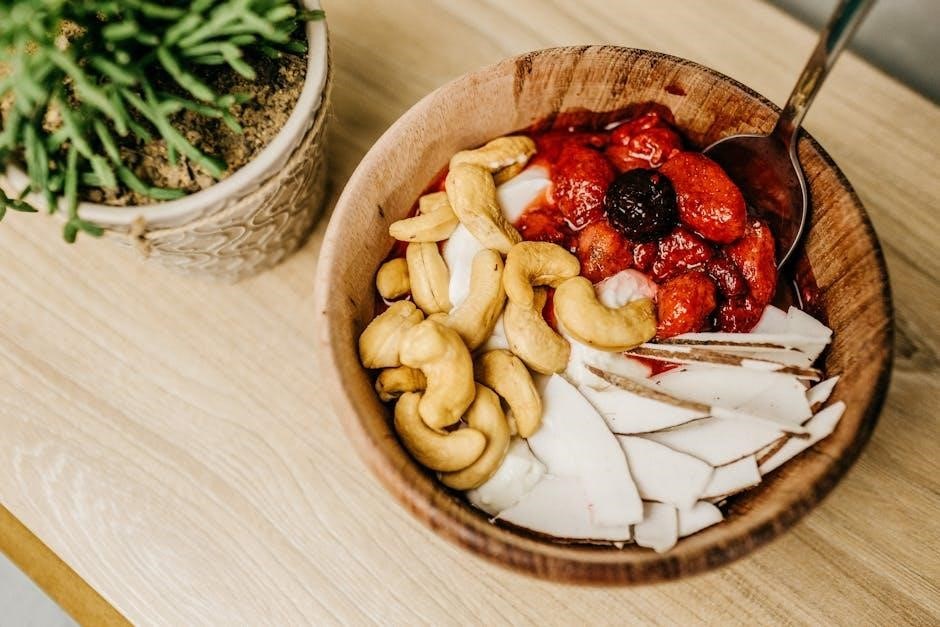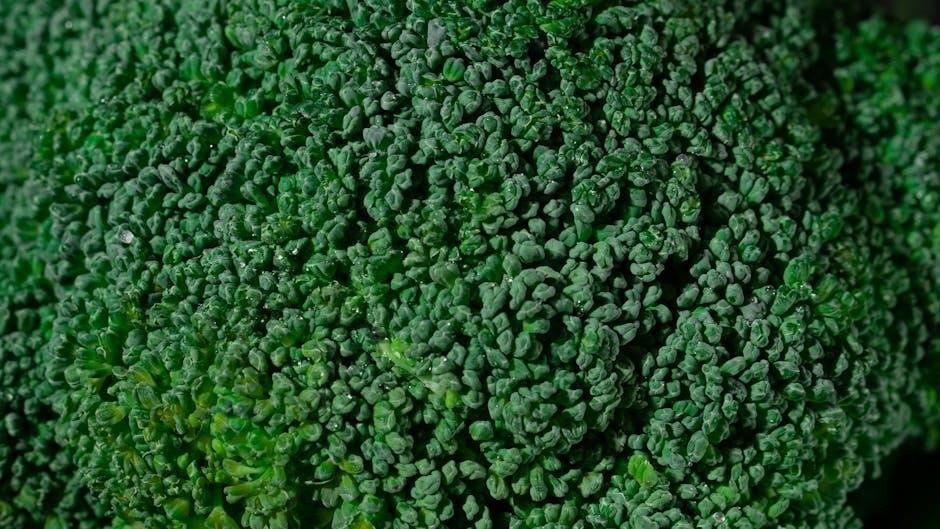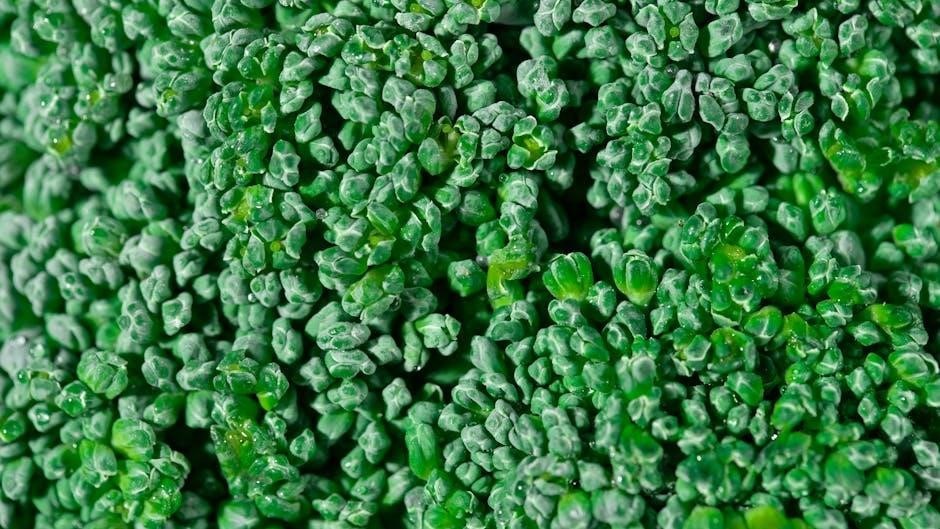plant based diet food list pdf
Summary
Discover the ultimate plant-based diet food list in PDF format. Your comprehensive guide to easy meal planning and delicious recipes. Download now!

A plant-based diet focuses on whole, minimally processed foods like vegetables, fruits, whole grains, legumes, and nuts, offering rich sources of nutrients, fiber, and antioxidants. It emphasizes reducing animal-derived products, promoting improved health and environmental sustainability while providing a balanced and flavorful eating pattern. A plant-based diet food list PDF can serve as a helpful guide for planning and incorporating these foods into daily meals.
What is a Plant-Based Diet?
A plant-based diet focuses on foods derived from plants, emphasizing whole, unprocessed options like vegetables, fruits, whole grains, legumes, nuts, and seeds. It minimizes or excludes animal products, offering a nutrient-dense eating pattern rich in fiber, vitamins, and antioxidants. This approach supports health and sustainability, aligning with a balanced and flavorful lifestyle.
Benefits of a Plant-Based Diet
A plant-based diet offers numerous health benefits, including improved heart health, weight management, and reduced risk of chronic diseases. It also supports environmental sustainability by lowering your carbon footprint and promoting water conservation. Embracing plant-based eating can lead to a more balanced and nutritious lifestyle, fostering overall well-being.

Staple Foods in a Plant-Based Diet
Plant-based diets rely on whole grains, vegetables, fruits, legumes, beans, nuts, and seeds. These foods provide essential nutrients, fiber, and variety for a balanced lifestyle.
Whole Grains
Whole grains are a cornerstone of a plant-based diet, offering fiber, vitamins, and minerals. Include oats, quinoa, brown rice, barley, and rye in your meals. They provide sustained energy and support digestion. A plant-based diet food list PDF often highlights these grains as essential for a balanced and nutritious eating plan.
Vegetables
Vegetables are a cornerstone of a plant-based diet, offering essential nutrients, fiber, and antioxidants. Dark leafy greens like spinach and kale, cruciferous vegetables such as broccoli, and colorful options like bell peppers provide vitamins and minerals. Incorporating a variety ensures a balanced intake of nutrients, supporting overall health and well-being in a plant-based lifestyle.
Fruits
Fruits are a vibrant and nutrient-rich component of a plant-based diet, providing essential vitamins, minerals, and antioxidants. Incorporate a variety like berries, citrus, and tropical options such as mangoes and bananas. Fruits add natural sweetness and energy, supporting overall health and well-being in a balanced and delicious plant-based lifestyle.
Legumes and Beans
Legumes and beans are protein-rich staples in a plant-based diet, offering high-quality nutrients like iron, zinc, and fiber. Include varieties such as lentils, chickpeas, black beans, and kidney beans. They are versatile, supporting heart health and providing sustainable energy, making them a cornerstone of balanced and nutritious meals in a plant-based lifestyle.
Nuts and Seeds
Nuts and seeds are rich in healthy fats, vitamins, and minerals, serving as excellent snacks or additions to meals. Almonds, walnuts, chia seeds, and flaxseeds are popular choices, offering omega-3 fatty acids and antioxidants. They support heart health and provide a crunchy texture, making them a nutritious and versatile part of a plant-based diet for enhanced well-being.
High-Protein Plant-Based Foods
Plant-based high-protein foods like legumes, beans, lentils, tofu, tempeh, seitan, and edamame offer versatile and nutritious options for building muscle and maintaining health on a plant-based diet.
Plant-Based Protein Sources
Plant-based protein sources include legumes, beans, lentils, tofu, tempeh, edamame, and seitan. Whole grains like quinoa and brown rice also provide protein. Nuts and seeds, such as almonds, chia seeds, and hemp seeds, are excellent options. These foods are nutrient-dense, offering fiber, vitamins, and minerals alongside protein, making them ideal for a balanced diet.
Meal Ideas for High-Protein Plant-Based Diets
Enjoy protein-packed meals like lentil curry with quinoa, chickpea salads, tofu stir-fries, black bean tacos, and edamame stir-fries. Smoothies with pea protein, chia pudding, and veggie burgers are great options. Stuffed bell peppers with brown rice and beans, or a hearty bowl of chickpea and spinach stew, also provide satisfying protein-rich meals for any time of day.
Sample Plant-Based Grocery List
A plant-based grocery list includes whole grains, vegetables, fruits, legumes, nuts, seeds, and healthy fats. Stock up on staples like brown rice, quinoa, chickpeas, lentils, avocados, and nuts for versatile meal preparation.
Essential Items for a Plant-Based Pantry
A well-stocked plant-based pantry includes whole grains like brown rice, quinoa, and oats, as well as legumes such as lentils, chickpeas, and black beans. Nuts, seeds, and healthy oils like almonds, chia seeds, and olive oil are staples. Canned goods, spices, and herbs like turmeric, cumin, and paprika add flavor. These items form the foundation of a balanced and nutritious plant-based diet.
Fresh Produce to Include
Fresh produce is a cornerstone of a plant-based diet, offering essential vitamins, minerals, and antioxidants. Include a variety of colorful vegetables like leafy greens, bell peppers, and carrots, as well as fruits such as berries, citrus, and apples. Opt for seasonal and organic options when possible to maximize flavor and nutritional benefits while supporting sustainable farming practices.
Environmental Benefits of a Plant-Based Diet
A plant-based diet significantly reduces carbon footprint by lowering greenhouse gas emissions and conserving water, supporting sustainable agriculture and protecting biodiversity for a healthier planet.
Reducing Carbon Footprint
A plant-based diet significantly reduces greenhouse gas emissions by minimizing reliance on resource-intensive animal agriculture. Animal farming contributes to deforestation, water pollution, and methane production, whereas plant-based foods require fewer resources. Choosing whole grains, legumes, and vegetables from a plant-based diet food list PDF helps lower your carbon footprint, promoting a more sustainable lifestyle and healthier planet.
Water Conservation
Plant-based diets play a crucial role in water conservation by reducing the demand for water-intensive animal products. Producing meat requires significantly more water compared to fruits, vegetables, and whole grains. By focusing on plant-based foods, individuals can lower their water footprint, supporting sustainable practices and conserving this vital resource for future generations.

Mindful Eating and Balanced Diets
Mindful eating emphasizes paying attention to your body’s hunger and fullness cues, fostering a balanced diet rich in whole, plant-based foods. A plant-based diet food list PDF helps plan nutritious meals, supporting health and sustainability.
Understanding Portion Sizes
Portion sizes in a plant-based diet are key to balancing nutrients and managing weight. Use a food list PDF to guide serving amounts, ensuring variety and moderation. Measure grains, legumes, and nuts to avoid overconsumption. Practice mindful eating by paying attention to hunger cues, stopping when satisfied, not stuffed. This approach supports long-term health and satisfaction.
Listening to Your Body’s Signals
Listening to your body’s signals is crucial for a balanced plant-based diet. Trust your hunger cues and stop when satisfied. Pay attention to how foods make you feel, adjusting choices to optimize energy and digestion. Avoid forcing meals and honor cravings mindfully. This intuitive approach fosters a healthier relationship with food and supports overall well-being, guided by your body’s needs.
Health Benefits of Plant-Based Diets
A plant-based diet is linked to reduced risks of chronic diseases, lower blood pressure, and improved heart health. It supports weight management and enhances overall well-being naturally.
Improved Heart Health
A plant-based diet significantly reduces the risk of heart disease by lowering cholesterol and blood pressure. Rich in antioxidants and fiber, foods like whole grains, fruits, and vegetables help maintain a healthy cardiovascular system. Incorporating these into your meals, as outlined in a plant-based diet food list PDF, supports overall heart well-being and long-term health benefits.
Weight Management
Plant-based diets are often naturally lower in calories and higher in fiber, promoting satiety and aiding in weight management; A focus on whole foods, as detailed in a plant-based diet food list PDF, helps maintain a healthy weight by reducing fat intake and increasing nutrient density, supporting sustainable and balanced weight control over time.
Transitioning to a Plant-Based Diet
Transitioning involves gradual changes, incorporating more plant-based foods and reducing animal products. A plant-based diet food list PDF provides guidance for balanced meal planning and smooth adaptation.
Step-by-Step Guide to Going Plant-Based
Start by assessing your current diet and identifying areas to incorporate more plant-based foods. Gradually replace animal products with alternatives like legumes, tofu, and whole grains. Plan meals using a plant-based diet food list PDF for guidance. Restock your pantry with staples and experiment with new recipes. Seek support from online communities or guides to ensure a smooth transition to a balanced and sustainable plant-based lifestyle.
Common Challenges and Solutions
Transitioning to a plant-based diet can present challenges like nutrient deficiencies or meal planning. Solutions include using a plant-based diet food list PDF for guidance, ensuring variety, and consulting with nutrition resources. Addressing protein needs with legumes and seeds, and staying hydrated are key. Community support and gradual changes can ease the process and maintain motivation.
Plant-Based Meal Planning Tips
A plant-based diet food list PDF helps plan balanced meals. Rotate ingredients seasonally and explore global recipes for variety. Incorporate herbs and spices to enhance flavor without compromise.
Creating a Weekly Meal Plan
Planning a weekly meal plan ensures variety and nutrition in your plant-based diet. Start by listing staple foods like whole grains, vegetables, and legumes. Include a mix of proteins, healthy fats, and vibrant fruits. Rotate ingredients to avoid repetition and incorporate seasonal produce for freshness. Use a plant-based diet food list PDF for inspiration and organization, ensuring balanced and delicious meals throughout the week.
- Monday: Quinoa salad with roasted vegetables
- Tuesday: Lentil soup with whole-grain bread
- Wednesday: Stir-fried tofu with mixed greens
- Thursday: Chickpea curry with brown rice
- Friday: Veggie burgers with sweet potato fries
- Weekend: Explore new recipes or meal prep
Incorporating Variety and Flavor
Add variety to your plant-based meals by exploring global cuisines, experimenting with spices, and using marinades. Incorporate colorful vegetables, legumes, and whole grains to enhance flavor and texture. Try creative recipes like vegan stir-fries, curries, or tacos. A plant-based diet food list PDF can inspire new combinations, ensuring meals remain exciting and nutritious while avoiding monotony.

Plant-Based Diet for Specific Needs
A plant-based diet can be tailored to meet specific needs, such as vegan or lacto-ovo vegetarian diets. A plant-based diet food list PDF offers detailed guidance for these tailored plans, ensuring all nutritional requirements are met while aligning with personal preferences or dietary restrictions.
Vegan Diet
A vegan diet excludes all animal-derived foods, focusing solely on plant-based ingredients. It includes fruits, vegetables, whole grains, legumes, nuts, and seeds. A plant-based diet food list PDF can help plan balanced vegan meals, ensuring adequate nutrition while promoting environmental sustainability and animal welfare. This diet is rich in fiber, vitamins, and antioxidants, supporting overall health and well-being.
Lacto-Ovo Vegetarian Diet
A lacto-ovo vegetarian diet includes plant-based foods along with dairy products and eggs. It combines the benefits of plant-based eating with additional protein and calcium sources. A plant-based diet food list PDF can guide meal planning, incorporating vegetables, whole grains, legumes, nuts, seeds, eggs, and dairy. This approach offers flexibility and balanced nutrition while reducing reliance on meat.
Creating a Personalized Plant-Based Diet Plan
Customize your diet by tailoring food choices to your preferences and nutritional needs. A plant-based diet food list PDF can help you craft a personalized plan, ensuring variety, balance, and alignment with your health and lifestyle goals.
How to Customize Your Diet
Customizing your plant-based diet involves assessing your nutritional needs, personal preferences, and lifestyle. Use a plant-based diet food list PDF to identify essential foods and portion sizes. Tailor meal plans by incorporating a variety of whole grains, vegetables, legumes, and nuts. Adjust based on activity levels and health goals to ensure a balanced and satisfying eating plan.
Using a Plant-Based Diet Food List PDF
A plant-based diet food list PDF provides a structured guide to essential foods, ensuring diversity and nutrition. It categorizes foods like whole grains, vegetables, legumes, and nuts, offering portion suggestions. This resource helps plan balanced meals, track intake, and maintain variety, making it easier to adhere to a plant-based lifestyle consistently and effectively.

Success Stories and Community Support
Many individuals share transformative journeys adopting plant-based diets, citing improved health and well-being. Online forums, social media groups, and local meetups foster connection and motivation, helping others stay committed to their plant-based lifestyle with shared recipes, tips, and encouragement from like-minded individuals.
Inspiring Stories of Plant-Based Diets
Countless individuals have transformed their lives by embracing plant-based diets, sharing stories of improved health, increased energy, and overall well-being. Many credit structured meal plans, like those found in a plant-based diet food list PDF, for guiding their journey. These stories highlight the empowerment and positive lifestyle changes that come with adopting a balanced, plant-centric eating pattern.
Finding Support and Resources
Discovering support for a plant-based lifestyle is easier than ever. Online communities, forums, and social media groups offer guidance and motivation. Downloadable resources like a plant-based diet food list PDF provide structured meal plans and grocery guides. Local workshops and wellness centers also offer hands-on support, helping individuals stay committed to their dietary goals and embracing a healthier, sustainable way of eating.

The Future of Plant-Based Diets
Plant-based diets are gaining popularity, driven by scientific research and sustainability trends. Innovations in food technology and a growing demand for ethical eating are shaping its future, supported by resources like a plant-based diet food list PDF to guide consumers in making informed, healthier choices.
Trends in Plant-Based Eating
Plant-based eating is rapidly gaining popularity, with increasing demand for vegan and vegetarian options. Celebrities and athletes are influencing the trend, while restaurants and grocery stores expand their plant-based offerings. Social media platforms and blogs further fuel the movement, sharing recipes and tips. Resources like a plant-based diet food list PDF are becoming essential tools for those adopting this lifestyle.
Scientific Research and Innovations
Recent studies highlight the health benefits of plant-based diets, such as improved heart health and weight management. Innovations in food technology have led to the development of plant-based alternatives, making it easier to adopt this lifestyle. Research continues to uncover the long-term benefits, while advancements in nutrition science provide better guidance for balanced plant-based eating.